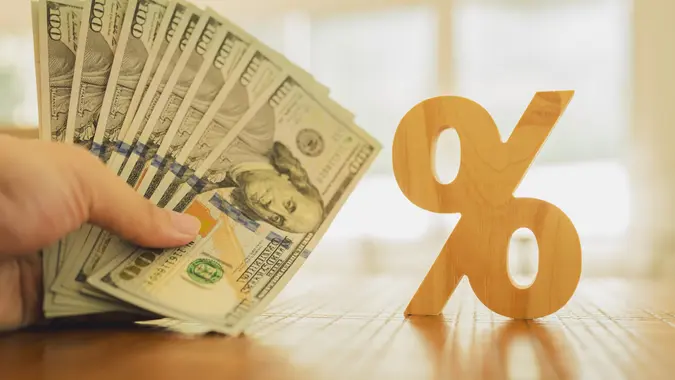Money Addiction: What Is It and How Can You Beat It?

Commitment to Our Readers
GOBankingRates' editorial team is committed to bringing you unbiased reviews and information. We use data-driven methodologies to evaluate financial products and services - our reviews and ratings are not influenced by advertisers. You can read more about our editorial guidelines and our products and services review methodology.

20 Years
Helping You Live Richer

Reviewed
by Experts

Trusted by
Millions of Readers
Money addiction is a behavioral issue where individuals develop an unhealthy obsession with money that could lead to negative financial behaviors. Unlike financial irresponsibility, money addiction is a chronic problem requiring recognition and active intervention. Here are tips for identifying and managing a money addiction.
Understanding Money Addiction
Money addiction, like other forms of addiction, is a chronic condition leading to compulsive behaviors surrounding money. These behaviors often deviate from normal financial management, extending to extreme saving, overspending, or gambling. The root causes of money addiction are complex, intertwining genetics, personal experiences, and environmental factors.
Signs of Money Addiction
Identifying a money addiction requires a keen observation of behaviors and attitudes toward money. Common signs include:
- An obsessive drive to obtain money, often to the detriment of personal relationships and other life priorities.
- Engaging in risky or dangerous financial behaviors, like gambling or making high-risk investments without considering potential losses.
- Constant anxiety or preoccupation with financial topics, even when financially stable.
The Impact of Money Addiction
The consequences of money addiction extend beyond financial distress, often straining personal relationships and inducing stress, anxiety, or other emotional problems. Compulsive behaviors may also hinder the ability to make rational financial decisions, leading to a vicious cycle of financial problems.
Overcoming Money Addiction
Recovering from money addiction is a process that begins with acknowledgment. Here are some steps to consider:
Acknowledge the Problem
The first step in overcoming money addiction is acknowledging that it exists. Reflect on your relationship with money and the negative impact it may have on your life. Accepting that there is an issue is crucial to moving forward.
Seek Professional Help
Consider seeking the guidance of a financial therapist or counselor specializing in addiction. They can provide the necessary support, strategies, and tools to help you overcome money addiction and develop healthier financial habits.
Create a Budget and Financial Plan
Developing a budget and financial plan is crucial to gaining control over your finances. Set realistic goals and track your spending to ensure you are living within your means. This will help you prioritize your financial well-being and reduce impulsive spending.
Build a Support System
Surround yourself with a supportive network of friends and family who can provide encouragement. Sharing your journey with others can be cathartic and help you stay accountable.
Practice Self-Care
Prioritize self-care to reduce stress and improve your overall well-being. Engage in activities that promote relaxation, such as meditation, exercise, or hobbies, as they can help distract from financial worries.
Celebrate Small Victories
Recognize and celebrate small victories along your journey of overcoming money addiction. Whether it’s paying off a debt or resisting an impulsive purchase, these milestones deserve acknowledgment and reinforcement.
The Takeaway
Through a combination of self-awareness, education, professional help, and support from loved ones, overcoming money addiction is an attainable goal. Taking the right steps will lead you toward a balanced and financially healthy life.
Editor's note: This article was produced via automated technology and then fine-tuned and verified for accuracy by a member of GOBankingRates' editorial team.
More From GOBankingRates
 Written by
Written by 

























